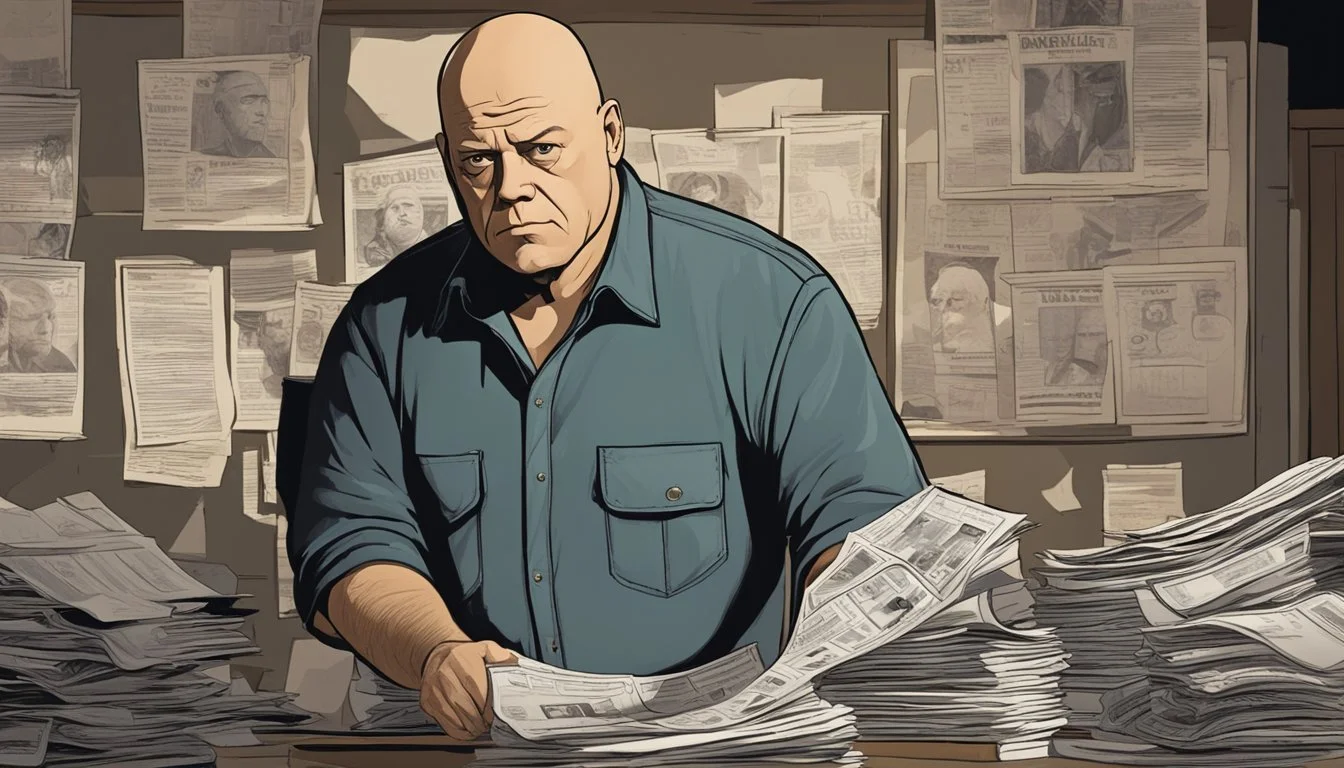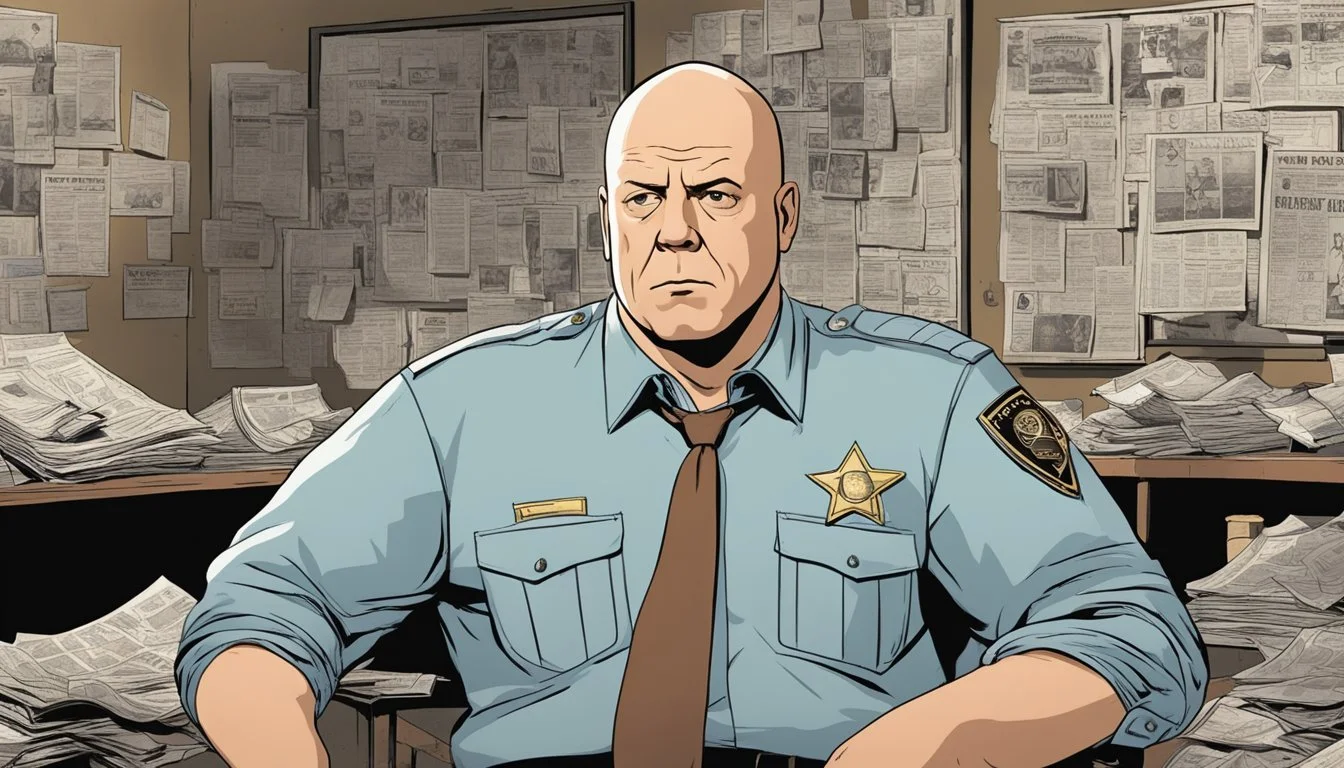Hank Schrader's Journey: From Comic Relief to Tragic Hero in Breaking Bad
A Character Arc Analysis
Hank Schrader's transformation in Breaking Bad stands as one of the most compelling character arcs in television history. Initially introduced as a brash, macho DEA agent who provided comic relief, Hank evolved into a complex and tragic figure over the course of the series.
Hank's journey from a stereotypical tough guy to a nuanced, sympathetic character captivated audiences and added depth to the show's exploration of morality and justice. As Walter White descended into villainy, Hank emerged as a beacon of integrity, tirelessly pursuing the truth despite personal and professional setbacks.
The contrast between Hank's initial portrayal and his eventual role as the series' moral center highlights Breaking Bad's masterful character development. His relentless pursuit of Heisenberg, unaware that the criminal mastermind was his own brother-in-law, created a tense, emotionally charged dynamic that drove much of the show's later seasons.
Character Background and Development
Hank Schrader's evolution from comic relief to tragic hero forms a captivating arc in Breaking Bad. His personal relationships, professional life, and interactions with other characters shape his complex journey.
Hank Schrader's Personal and Professional Life
Hank Schrader, portrayed by Dean Norris, begins as a boisterous, macho DEA agent in Albuquerque. He's married to Marie, Skyler White's sister, connecting him to the main White family.
Hank's brash exterior masks insecurities and depth. He copes with stress through humor and bravado. His dedication to his job is evident, even as it strains his personal life.
As the series progresses, Hank faces significant challenges. A promotion to ASAC (Assistant Special Agent in Charge) increases his responsibilities and stress levels.
Hank's Role in the DEA
In the DEA, Hank proves to be a skilled and determined agent. His pursuit of the elusive "Heisenberg" becomes a driving force in his career and the series' plot.
Hank's investigative skills shine as he uncovers crucial evidence. He follows leads tenaciously, often putting himself in danger.
His work brings him into conflict with dangerous cartels. A confrontation with the Salamanca twins leaves Hank seriously injured, impacting his physical and mental health.
Influence of Family Relationships
Hank's relationship with Marie is complex but loving. She supports him through his recovery and career challenges.
His bond with Walter Jr. is that of a fun-loving uncle. Hank serves as a positive male role model, contrasting with Walt's increasingly distant behavior.
Hank's relationship with Walt evolves dramatically. Initially seeing Walt as a mild-mannered brother-in-law, Hank's perception changes as he uncovers Walt's secret life.
Intersection with Main Characters
Hank's path increasingly intersects with Walt's as the series progresses. Their cat-and-mouse game forms a central conflict.
His interactions with Jesse Pinkman evolve from dismissive to investigative. Hank's pursuit of justice puts him at odds with characters on both sides of the law.
Hank's moral code clashes with the criminal world he investigates. This conflict culminates in high-stakes confrontations that test his resolve and ultimately shape his tragic fate.
Hank's Place in the 'Breaking Bad' Narrative
Hank Schrader's character arc is pivotal to the overarching story of Breaking Bad. His journey from comic relief to tragic hero parallels Walter White's descent into villainy, creating a compelling contrast that drives the series forward.
Introduction to the Series
Breaking Bad introduces Hank as Walt's boisterous brother-in-law and a DEA agent. Initially, he serves as a foil to Walt's mild-mannered persona. Hank's brash humor and machismo provide levity in early episodes.
His role as a DEA agent sets up the central conflict. Unbeknownst to Hank, he's hunting his own family member. This dramatic irony creates tension that builds throughout the series.
Evolution Across the Seasons
Hank's character deepens as the show progresses:
Season 2: Hank faces trauma after a shootout in El Paso.
Season 3: He becomes obsessed with the Heisenberg case.
Season 4: Hank's investigation intensifies despite being bedridden.
Season 5: His pursuit of Heisenberg reaches its climax.
Each season peels back layers of Hank's personality. His dedication to justice and family loyalty are constantly tested. This evolution transforms him from a simple comic character to a complex, tragic figure.
The Turning Points
Key moments reshape Hank's role in the narrative:
The shootout in El Paso (Season 2)
His attack by the Cousins (Season 3)
Discovering Walt is Heisenberg (Season 5)
These events push Hank from the periphery to the center of the story. His PTSD and physical recovery humanize him. The revelation about Walt makes Hank the primary antagonist to the series' protagonist-turned-villain.
Climactic Moments
Hank's storyline reaches its peak in Season 5. The episode "Ozymandias" marks the tragic culmination of his journey. His confrontation with Walt in the desert is a masterclass in tension.
Hank's final stand against Jack's gang showcases his unwavering moral compass. His refusal to beg for his life cements his status as a tragic hero.
Even after his death, Hank's presence looms large. The series finale, "Felina," sees Walt ensuring Hank's body is found, providing closure to his arc.
Character Complexity and Growth
Hank Schrader's character evolves significantly throughout Breaking Bad, showcasing depth and nuance. His journey from comic relief to a complex, tragic figure reveals layers of personality and moral conflict.
Hank as a Source of Comic Relief
Initially, Hank serves as the show's comic relief. His brash DEA agent persona contrasts sharply with Walter White's meek chemistry teacher image. Hank's loud jokes and macho bravado provide levity in tense situations.
He frequently cracks inappropriate jokes about his law enforcement work. His homebrewed beer, Schraderbräu, becomes a running gag. These elements paint Hank as a one-dimensional character at first.
The Shades of Hank's Morality
As the series progresses, Hank's moral compass comes into focus. His unwavering commitment to justice clashes with the corrupt world of methamphetamine distribution he investigates.
Hank's pursuit of "Heisenberg" reveals his dedication to law and order. He shows a strong sense of right and wrong, even when it puts him at odds with his colleagues or family.
His moral code is tested when he discovers Walt's true identity. This revelation forces Hank to confront difficult choices between family loyalty and professional duty.
Signs of Vulnerability
Beneath Hank's tough exterior, vulnerabilities emerge. His encounter with the dangerous twins leaves him with PTSD and physical challenges.
Hank struggles with anxiety and panic attacks, revealing a softer side to his character. His mental health issues humanize him and add depth to his portrayal.
These struggles impact his work and personal life. Hank's determination to overcome his fears and continue his investigation demonstrates his resilience and complexity as a character.
Conflicts and Challenges
Hank Schrader faced numerous adversaries and personal struggles throughout Breaking Bad. His journey was marked by dangerous confrontations, formidable foes, and internal battles that tested his resolve.
Hank's Confrontations with the Drug World
Hank's role as a DEA agent put him in direct conflict with Albuquerque's drug trade. He pursued leads relentlessly, often putting himself in harm's way. His investigations led to violent encounters with cartel members and local dealers.
Hank's pursuit of the elusive Heisenberg became his most significant case. Unaware that Walter White was behind the pseudonym, Hank's determination to catch this mysterious drug kingpin grew stronger with each setback.
His clash with Tuco Salamanca was particularly brutal. The confrontation left Hank shaken but reinforced his commitment to bringing down drug operations.
Encounters with Notable Antagonists
Hank's path crossed with several dangerous criminals throughout the series. His interactions with Gus Fring were tense and layered with suspicion. Fring's carefully crafted public persona made it challenging for Hank to expose his true nature.
The Salamanca family posed a constant threat. Hector Salamanca's silent but menacing presence and the violent tendencies of his relatives kept Hank on high alert.
In later seasons, Hank faced off against Jack Welker's neo-Nazi gang. This conflict culminated in a dramatic showdown that would prove pivotal for Hank's character arc.
Personal Battles and Health Issues
Hank's professional life took a toll on his personal well-being. After surviving a brutal attack by the Salamanca cousins, he faced a long and painful recovery. This period tested his mental fortitude and strained his relationship with Marie.
His physical limitations frustrated him deeply. Hank struggled with feelings of inadequacy and anger during his rehabilitation. These challenges added depth to his character, showcasing his vulnerability beneath the tough exterior.
Impact of PTSD
The trauma from his encounters in the field left lasting scars on Hank's psyche. He experienced panic attacks and symptoms of Post Traumatic Stress Disorder (PTSD). These episodes often struck at inconvenient times, compromising his ability to function normally.
Hank's PTSD manifested in various ways:
Flashbacks to violent encounters
Heightened anxiety in everyday situations
Difficulty sleeping and nightmares
Mood swings and irritability
His struggle with PTSD added a layer of complexity to his character. It highlighted the human cost of his dedication to law enforcement and the toll of confronting dangerous criminals.
Hank's Legacy in the 'Breaking Bad' Universe
Hank Schrader's impact on Breaking Bad extends far beyond his role as a DEA agent. His character's evolution and ultimate fate shaped the series' narrative and left a lasting impression on viewers.
Influence on the Show's Outcome
Hank's relentless pursuit of Heisenberg drove much of Breaking Bad's plot. His investigation created tension and conflict, pushing Walter White to take increasingly desperate measures. As Hank pieced together the truth, the show's stakes rose dramatically.
Hank's integrity and dedication to justice stood in stark contrast to Walt's moral decay. This juxtaposition highlighted the series' themes of good versus evil and the corrosive nature of power.
His death in the desert marked a pivotal moment, spurring Walt's eventual downfall and redemption attempt. Hank's sacrifice became a catalyst for the show's climactic events.
Connections to 'Better Call Saul'
Though Hank's appearances in Better Call Saul were limited, they added depth to his character. These scenes provided insight into his earlier career and relationship with the criminal underworld.
His interactions with Saul Goodman and the DEA foreshadowed future events in Breaking Bad. These connections enriched both series, creating a more cohesive shared universe.
Hank's presence in Better Call Saul reinforced his importance to the overall narrative. It demonstrated Vince Gilligan's commitment to fully developing even supporting characters.
Audience Perception and Critical Reception
Viewers initially saw Hank as comic relief, but his character growth earned widespread acclaim. Critics praised Dean Norris's nuanced performance as Hank evolved into a tragic hero.
Hank's journey resonated with audiences, who admired his determination and moral compass. His flaws and vulnerabilities made him relatable, despite his sometimes brash exterior.
The character's arc from obnoxious brother-in-law to respected lawman showcased Breaking Bad's exceptional character development. Hank's transformation contributed significantly to the show's critical success and enduring popularity.
The Artistry of Hank's Arc
Hank Schrader's transformation in Breaking Bad exemplifies masterful character development. His journey from comic relief to tragic hero showcases the show's intricate storytelling and thematic depth.
Writing and Direction
Vince Gilligan and the writing team crafted Hank's arc with precision. They gradually revealed layers of his personality, moving from surface-level humor to complex motivations. Hank's pursuit of Heisenberg became a driving force, paralleling Walter White's descent into criminality.
The direction emphasized Hank's changing role visually. Early scenes used bright lighting and wide shots to capture his boisterous presence. As the series progressed, tighter framing and moodier lighting reflected his growing intensity and isolation.
Key plot points, like the confrontation with the cousins, marked significant shifts in Hank's character. These moments were carefully paced to maximize emotional impact and narrative tension.
Performance by Dean Norris
Dean Norris breathed life into Hank Schrader with nuanced acting. His portrayal evolved from broad comedy to subtle drama, mirroring the character's growth. Norris conveyed Hank's vulnerability through small gestures and expressions, particularly during his recovery arc.
His ability to balance Hank's tough exterior with inner turmoil added depth to the character. Norris's chemistry with the cast, especially Bryan Cranston, enhanced the show's interpersonal dynamics.
The actor's commitment to Hank's physical transformation was notable. He captured both the character's initial bravado and later fragility with authenticity.
Symbolism and Thematic Elements
Hank's character arc incorporated rich symbolism. His mineral collection represented his search for order and understanding in a chaotic world. The juxtaposition of his law enforcement role with Walt's criminal activities highlighted the show's moral ambiguity.
Thematically, Hank embodied the consequences of unrelenting pursuit of justice. His obsession with catching Heisenberg paralleled Walt's obsession with building his empire, creating a compelling duality.
The show used Hank to explore themes of masculinity and vulnerability. His struggle with PTSD challenged stereotypes of the tough-guy cop, adding layers to his character and the series' exploration of identity.
Themes and Real-World Parallels
Breaking Bad explores complex themes through Hank Schrader's character arc, reflecting societal issues and moral dilemmas. His journey delves into the challenges of law enforcement, personal relationships, and conflicting loyalties.
The War on Drugs
Hank's role in the Drug Enforcement Administration (DEA) provides a window into the real-world complexities of combating illegal narcotics. His pursuit of drug cartels in Albuquerque mirrors the ongoing struggles faced by law enforcement agencies nationwide.
The series highlights the dangerous cat-and-mouse game between the DEA and drug manufacturers. Hank's investigation of meth labs and his encounters with cartel members showcase the risks and moral ambiguities inherent in this line of work.
Breaking Bad also raises questions about the effectiveness of current drug policies. Hank's dedication to his job contrasts with the seemingly unstoppable flow of illegal substances, prompting viewers to consider the broader implications of the war on drugs.
Masculinity and Vulnerability
Hank's character arc challenges traditional notions of masculinity in law enforcement. Initially portrayed as a brash, macho DEA agent, his development reveals a more nuanced and vulnerable side.
As the series progresses, Hank faces physical and emotional challenges that test his perception of strength. His struggle with PTSD after a violent encounter and his recovery from a near-fatal shooting demonstrate the human toll of his profession.
These experiences force Hank to confront his own vulnerabilities, leading to a more empathetic and emotionally aware character. His growth reflects broader societal discussions about mental health and masculinity in high-stress occupations.
Duty Versus Family
Hank's loyalty to his job as a DEA agent often conflicts with his familial obligations, particularly when he discovers Walter White's involvement in the drug trade. This tension explores the difficult balance between professional duty and personal relationships.
His pursuit of the elusive "Heisenberg" becomes a moral quandary when he realizes the truth about his brother-in-law. Hank must choose between upholding the law and protecting his family, a decision that ultimately leads to tragic consequences.
This conflict resonates with real-world scenarios where law enforcement officers face ethical dilemmas involving friends or family members. Hank's struggle highlights the personal cost of unwavering dedication to justice in a morally gray world.






